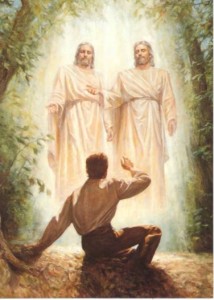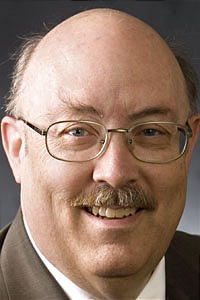Q. Why does the LDS use the KJV of the Bible and not the Inspired Version that Joseph Smith translated himself? I am a member of a Baptist church now but I grew up and was in the RLDS. I still have my three-in-one and and I find that the inspired version speaks to me more and I get more out of it than any other translation there is. I eagerly await your reply. Oh and although I am a Baptist now, I do not agree with people claiming Mormons and other LDS-based churches are not Christians and I respect what your church as done over the years. Keep up the good work; I know you are winning souls for Jesus. -Ivan
A. Thank you for your kind words, Ivan. I’m glad you are reading from the Inspired Version. I agree that it’s a tremendous resource for Bible study and worship and I pray you will continue to study it.
For the rest of our readers, let me explain a few things about your question before I get to the answer:
RLDS is an acronym for the Reorganized Church of Jesus Christ of Latter Day Saints, now known as the Community of Christ, an off-shoot religion based on the one Joseph Smith founded in 1830. When the prophet Joseph Smith, Jr. was martyred in 1844, there was some confusion among the latter-day saints who should rise to lead them as the next prophet and president of the Church. A majority recognized the prophetic mantle had fallen upon Brigham Young and followed him west to the Utah desert. Some believed that eleven-year-old Joseph Smith III was supposed to succeed his father; this group remained in Illinois and eventually coalesced into the RLDS Church in 1860.
The Inspired Version of the Bible is also known as the Joseph Smith Translation (JST). It is an English-language translation of the Holy Bible based upon the King James Version (KJV). More details to follow.
A Three-in-One is a printing of the RLDS scriptures, including the Inspired Version of the Bible (JST), the Book of Mormon, and the Book of Doctrine and Covenants. It is similar to an LDS Quad, except we have four books (including the Pearl of Great Price), our Doctrine & Covenants is a bit different, and our Bible is KJV instead of JST. This is what prompted Ivan’s question (why don’t Mormons use JST?)
The Joseph Smith Translation
When Joseph Smith translated the Book of Mormon, he learned that the Bible was incomplete. An angel taught the Book of Mormon prophet-king Nephi that, “when [the Bible] proceeded forth from the mouth of a Jew it contained the fulness of the gospel of the Lord, [but corrupt groups] have taken away from the gospel of the Lamb many parts which are plain and most precious; and also many covenants of the Lord have they taken away” (1 Nephi 13:24,26). In other words, the Bible lost some of its original teachings over the centuries and it needed to be corrected.
Fortunately, God’s work cannot be thwarted. Jesus taught, “Heaven and earth shall pass away, but my words shall not pass away” (Matthew 24:35). After Joseph had completed his translation of the Book of Mormon by the gift and power of God, the Lord instructed him to do a similar work on the Holy Bible, but instead of being a translation from one language to another, it would be a translation from corruption to purity by the gift and power of God. In many instances, the original writings of the ancients were restored. Some of the changes Joseph implemented were meant to give verses a “plainer” meaning (clarifying archaic phrases or harmonizing doctrines), and a majority were simply grammatical improvements.
One of the most significant changes was made to Genesis. Instead of starting with “In the beginning…”, the JST opens with an encounter Moses had with God on Mount Sinai. Moses asks the Lord about the earth and why it was created. The Lord shows Moses a vision of the seven days of creation, and of Adam and Eve, etc. At this point, it jumps into the familiar KJV story, and it also includes more details on various other things, including the mysterious character named Enoch, who “walked with God” (Genesis 5:24). This section of the JST is included in the Pearl of Great Price and is known as the Book of Moses. You can (and should!) read the Book of Moses. It gives wonderful insights into the fall of Adam and Eve, knowledge of the plan of redemption in ancient times, the purpose of life and much more.
There are many other JST changes throughout the length of the Bible. Most of the doctrinally-relevant ones can be found in the LDS edition of the Bible (in the footnotes, or in an appendix for lengthier passages). The full text is also available online at this link.
How Do Mormons Use the JST?
The Joseph Smith translation is not the official Bible of the LDS Church; the King James Version is. Among the reasons for this are the following:
- It was never formally published by Joseph Smith. Although he clearly worked his way through the entire Bible by 1833, he was still making minor edits at the time he was killed in 1844, and it is unclear in some cases whether the notes he left in his margins and on his manuscripts were private thoughts or revealed truths.
- At Joseph’s death, the manuscripts for the JST were in the possession of his widow, Emma. As Brigham Young was preparing to move the latter-day saints west, he requested that she provide them to him but he was denied (Emma had some animosity toward Brigham that led her to stay in Illinois; she became part of the RLDS Church when it was formed).
- When the RLDS Church began publishing the Inspired Version, LDS Church leaders in Utah were suspicious that the RLDS publishers may have made some illegitimate changes. Decades later, they finally allowed the Utah Mormons to examine the original manuscripts and their fears were allayed.
- For many years the RLDS Church maintained the copyright.
Even though the KJV is the LDS official Bible, the Book of Moses and the JST of Matthew 24 are officially canonized in the Pearl of Great Price. And, like I mentioned above, we have footnotes (I highlighted all of mine with green colored pencil) and an appendix full of JST notes as valuable resources to study. So, Ivan, we do believe in and study the Inspired Version.
The JST is a tremendous blessing for anyone seeking a better understanding of Bible teachings; I encourage you to use it often in your Bible study.
 Either Joseph Smith was honest about his first encounter with God or he lied about it. He was visited frequently by angels or he wasn’t visited at all. He was a prophet or a hoaxer. If one is not Mormon and will not be baptized, “Joseph Smith was a fraud” is the stance one is required to take. The middle ground is removed.
Either Joseph Smith was honest about his first encounter with God or he lied about it. He was visited frequently by angels or he wasn’t visited at all. He was a prophet or a hoaxer. If one is not Mormon and will not be baptized, “Joseph Smith was a fraud” is the stance one is required to take. The middle ground is removed.
